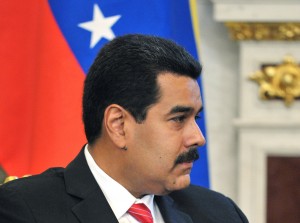Snowden’s options narrow as several nations reject asylum

Venezuela’s President Nicolas Maduro listens to Russian President Vladimir Putin, unseen, during their meeting at the Kremlin in Moscow, Tuesday, July 2, 2013. Maduro told Russian reporters on Tuesday that his country has not received an application for asylum from Snowden and dodged the question of whether he would take Snowden away with him. AP PHOTO/RIA NOVOSTI, ALEXEI NIKOLSKY, PRESIDENTIAL PRESS SERVICE
MOSCOW—Several countries rushed to reject asylum requests from fugitive US intelligence leaker Edward Snowden on Tuesday after he sought safe haven in 21 nations in a bid to win protection from American authorities.
As Snowden’s options appeared to narrow, Washington said it was hopeful that he would return home soon to face trial.
Most European countries either flatly rejected the request or reacted coolly. But the leftist leaders of Venezuela and Bolivia rose to the 30-year-old’s defense and said they would consider the application under the right conditions.
Snowden found particular support in Nicolas Maduro of Venezuela—a long-term thorn in the side of the United States.
“What he did was reveal a big truth so that we could avoid a war,” Maduro said during a two-day visit to Moscow for an energy summit.
Article continues after this advertisement“What is happening now should not be— he never killed anyone or planted any bombs.”
Article continues after this advertisementBut Maduro refused to entertain speculation he might take Snowden on a plane with him from Moscow—a possibility raised both by Russian media and political observers of the explosive case.
Bolivian President Evo Morales also said his country was willing to consider giving Snowden asylum.
“If there were a request, of course we would be willing to debate and consider the idea,” Morales told Russia’s state-run RT television in comments translated from Spanish.
Rejection from Europe
Poland immediately rejected Snowden’s petitions while an Indian foreign ministry spokesman said there was “no reason to accede to the request.”
Germany and the Netherlands also said no while Brazil said it was “not going to respond.”
And a spokesman for Russian President Vladimir Putin said Snowden himself had decided to scrap his petition with Moscow—where he has been stranded in an airport transit zone since June 23—after the Kremlin chief said he wanted him to stop releasing damaging allegations about the United States.
“He abandoned his intention and his request to receive the chance of staying in Russia,” Putin’s spokesman Dmitry Peskov told reporters.
The WikiLeaks anti-secrecy website— its associate Sarah Harrison traveling with the former National Security Agency contractor—said he had sent out applications to 13 European countries as well as six Latin American nations along with China and India.
A Chinese foreign ministry spokesman in Beijing said: “I’ve seen some reports of his petition for political asylum in some countries but I have no information about that.”
Austria, Finland, Iceland and Norway confirmed they had each received the request but the petition was invalid because it was not filed from inside their respective countries. Ireland and Spain issued similar statements.
France and Switzerland said they had not yet received an application while Italy said it was “contemplating” the request.
Twelve countries have still not said whether they have processed Snowden’s application or if the ones they had received were valid even though they were made outside their respective states.
Snowden denounces US
Snowden has remained quiet and out of sight of reporters since arriving at Sheremetyevo Airport.
He had planned to travel to Cuba the following day but never got on the flight because he lacked the proper boarding papers after his US travel passport was revoked.
Late Monday, he issued his first statement since his arrival in Moscow—a blistering attack on the United States.
He accused Washington of pressuring foreign leaders to refuse him refuge after the US authorities charged him with espionage for his intelligence leaks.
“These are the old, bad tools of political aggression,” Snowden said in a statement published by WikiLeaks.
“Their purpose is to frighten, not me, but those who would come after me.”
But a top US official rejected Snowden’s claims that the United States was trying to bully countries into refusing his request for political asylum.
US officials have been “in touch, as we have been for several days now, with a broad range of countries that could serve as either transit spots or final destinations,” State Department spokeswoman Jen Psaki said Tuesday.
She said the US was telling countries that “Snowden has been accused of leaking classified information. He is somebody that we would like to see returned to the United States, of course. And we are hopeful that will happen.”
Asked if she would object to the characterisation of such contacts as “bullying or arm-twisting,” Psaki replied: “I think that’s clear.”
Snowden’s latest major leak about US spying on EU countries has angered many European governments and threatened to derail preparations for delicate talks on a massive free trade deal between Washington and Brussels.—Dmitry Zaks